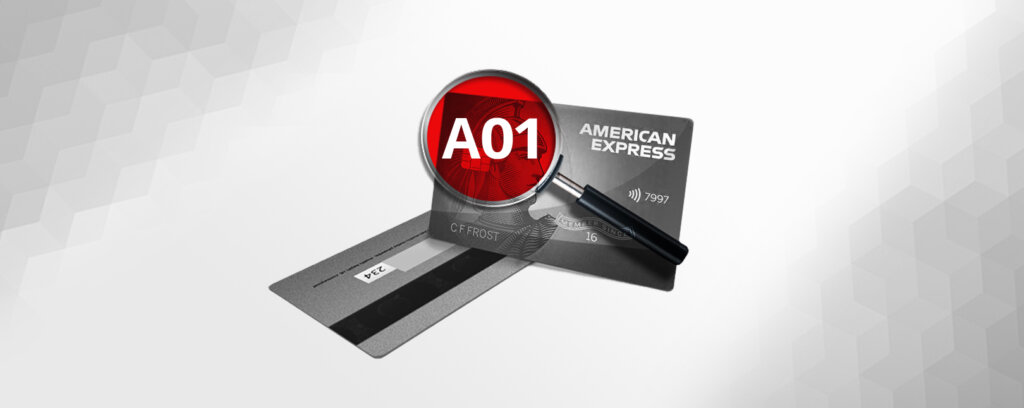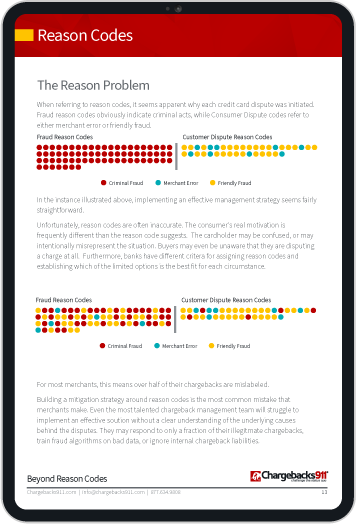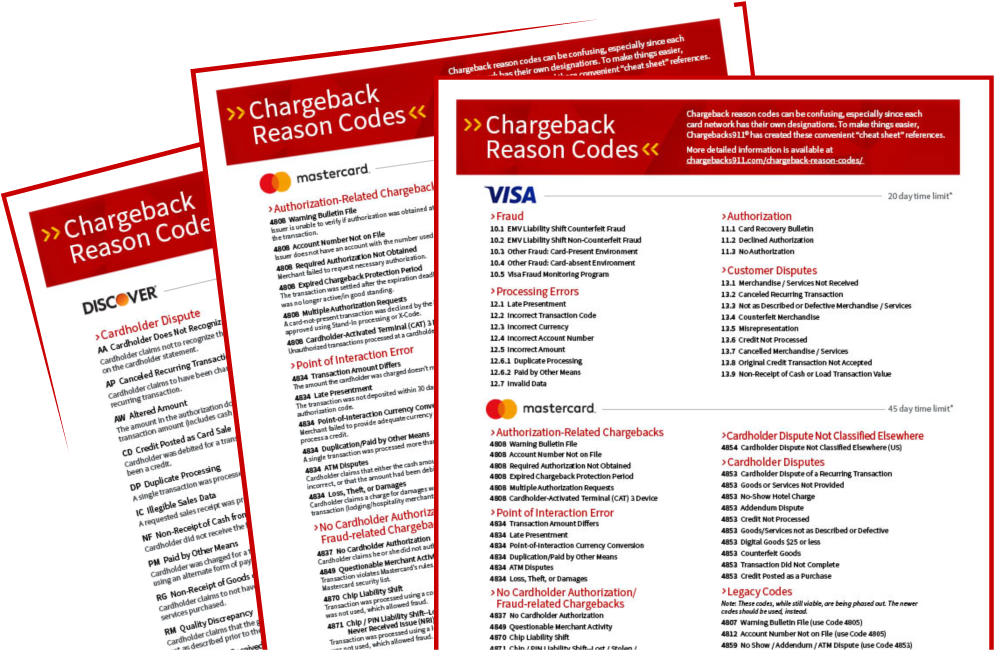
How to Handle Amex Reason Code A01 Chargebacks
American Express breaks down the acceptable causes for a customer to dispute a credit card transaction in their dispute guidelines. This is done for the sake of simplicity and standardization.
Each chargeback trigger has a designated “reason code.” Amex can then assign the appropriate code to each case to show the given reason for the chargeback.
Learn more about Amex reason codes
Today, we’re looking at one reason code in particular — Amex reason code A01 — and exploring the causes, timeframes, fees, and other specifics. We’ll also explore what you can do to prevent these chargebacks from happening.
Recommended reading
- Best Credit Card Processing Companies of 2025 REVEALED
- Credit Card Disputes | Step-by-Step Process Guide for 2025
- Mastercard Chargeback Time Limits: The 2025 Guide
- Chargebacks911® are Finalists for ‘Outstanding CX in Digital Sales Strategy’ for 2025!
- How to Detect Fraud: Top 20 Tips to Stop eCommerce Scams
- Verifi Order Insight: Using Data to Block Visa Disputes
What is American Express Reason Code A01?
American Express chargeback reason code A01 is “Charge amount exceeds authorization amount.” This reason code is used to explain that the total amount of the transaction was greater than the amount that the bank had initially authorized at the time that the card was swiped.
This can happen when the final total is not known at the time of authorization, and the merchant requests authorization for a projected amount. This is ordinarily not a problem; it’s a standard practice in many industries.
However, if the final total total exceeds the amount authorized due to unforeseen circumstances, additional authorization approval must be obtained. If the merchant attempted the transaction without obtaining this authorization, it could lead to an A01 chargeback.
What Caused This Dispute?
Amex Chargeback Reason Code A01 is primarily issued when additional charges or fees were added to the charge amount after authorization approval was received. To demonstrate, this scenario can arise if:
- Any additional charges or fees were added to the charge amount after authorization was received
- A restaurant total charge amount exceeds the amount you received authorization approval for by more than 20%
- A cruise line, lodging, or vehicle rental total charge amount exceeds the amount you received authorization approval for by more than 15%
Again, these situations can be handled properly by requesting authorization for additional funds.

How to Respond to Amex Reason Code A01 Chargebacks
So, what happens if you can prove no charges were applied to the cardholder’s statement that were not already authorized?
Naturally, if you receive an Amex A01 chargeback, you’ll want to resolve the issue right away. If you feel that the chargeback was filed in error, you should file a dispute response. This is done through a process called representment.
Representment is the process through which you’ll challenge a chargeback. You provide evidence to the card issuer (in this case, American Express) that all aspects of the transaction were legitimate and in accordance with the card issuer's policies. This can involve several key pieces of evidence.
Also, remember that there’s a strict time limit to consider. You have just 20 days in which to submit your response to American Express. However, this time frame also includes the time it took for your acquirer to provide you with a dispute notification, as well as time spent by the acquirer reviewing and submitting your case. In practical terms, you’ll often have five days or less in which to prepare and submit your response.
Acceptable Evidence for Amex Reason Code A01 Responses
You can re-represent these charges under the condition that you have compelling evidence.
For American Express reason code A01 chargebacks, you’ll need to provide detailed records of the transaction, including invoices and receipts. You’ll also need evidence to show proof of authorization in the amount charged.
Alternatively, you might have already issued a credit to the buyer as a way of trying to avoid the dispute. In this case, you’ll need to offer proof that you already provided a credit to offset the amount charged.
The success of representment depends on the thoroughness and relevance of the evidence provided. Maintaining detailed records of transactions and communications with customers is vital to effectively counteract all chargebacks, including those under reason code A01.
How to Prevent Amex Reason Code A01 Chargebacks
As the old adage goes, “an ounce of prevention is worth a pound of cure.”
You may never be able to stop chargebacks entirely. But, you can limit your exposure to risk and keep your chargeback ratio in good standing by adopting a few best practices. Generally speaking, you’ll want to:
- Ensure all authorization approval requests comply with the Technical Specifications for Authorization.
- Ensure the total charge amount represents all charges and fees for goods/services purchased before requesting authorization approval.
- Request a new authorization approval when the final total charge amount exceeds the amount for which you received approval.
- Obtain and submit additional authorization approvals where required (recurring billing, cruise line, lodging, vehicle rental, restaurant, etc.).
Preventing Amex Reason Code A01 Chargebacks: Restaurants, Cruise Lines, Lodging, & Vehicle Rentals
Amex also lays out specific instructions for a few verticals that frequently struggle with Amex 01 chargebacks. These include:
At the end of a service period, if a final charge exceeds the initially authorized amount by more than 15%, you’ll need to get additional approval for the extra charges. This applies to all of the verticals outlined above, except restaurants. This step is pretty essential when a customer decides to extend their rental period or has agreed in writing to charges for significant damages.
Obtaining proper authorization ensures that all charges are transparent and approved by the cardholder, avoiding any potential disputes and maintaining a positive customer relationship. Additionally, subscribing to updates from American Express regarding changes in policies, security requirements, and best practices for fraud prevention can keep your business ahead of potential threats.
FAQs
Does Amex investigate chargebacks?
Yes. American Express investigates chargebacks by reviewing the evidence provided by both the merchant and the cardholder to determine the legitimacy of the transaction and decide on the chargeback claim. This process ensures a fair resolution based on the documentation and arguments presented by both parties.
What is the reason code for a chargeback on American Express card?
An American Express chargeback reason code is a code that identifies the specific reason a cardholder or issuing bank has disputed a transaction, guiding the merchant on the nature of the dispute and what evidence may be required to contest it. Each code corresponds to a particular issue, such as unauthorized use, processing errors, or non-receipt of goods or services. Click here to see a full list of Amex reason codes.
Do police investigate chargebacks?
Police typically do not investigate chargebacks as they are considered a dispute between the merchant and the cardholder, handled through the card issuer's internal processes. However, if fraud is suspected as the cause of a chargeback, law enforcement may be involved in investigating the fraudulent activities.
How successful are Amex disputes?
The success of an American Express dispute depends on the merchant's ability to provide compelling evidence that the transaction was valid and in accordance with Amex policies. Success rates vary widely based on the nature of the dispute and the quality of the documentation provided by the merchant.
How does American Express investigate disputes?
American Express investigates disputes by reviewing documentation and evidence provided by both the cardholder and the merchant, such as transaction receipts, proof of delivery, or communication records, to determine the validity of the chargeback claim. This process aims to ensure a fair resolution based on the facts presented by both parties.









